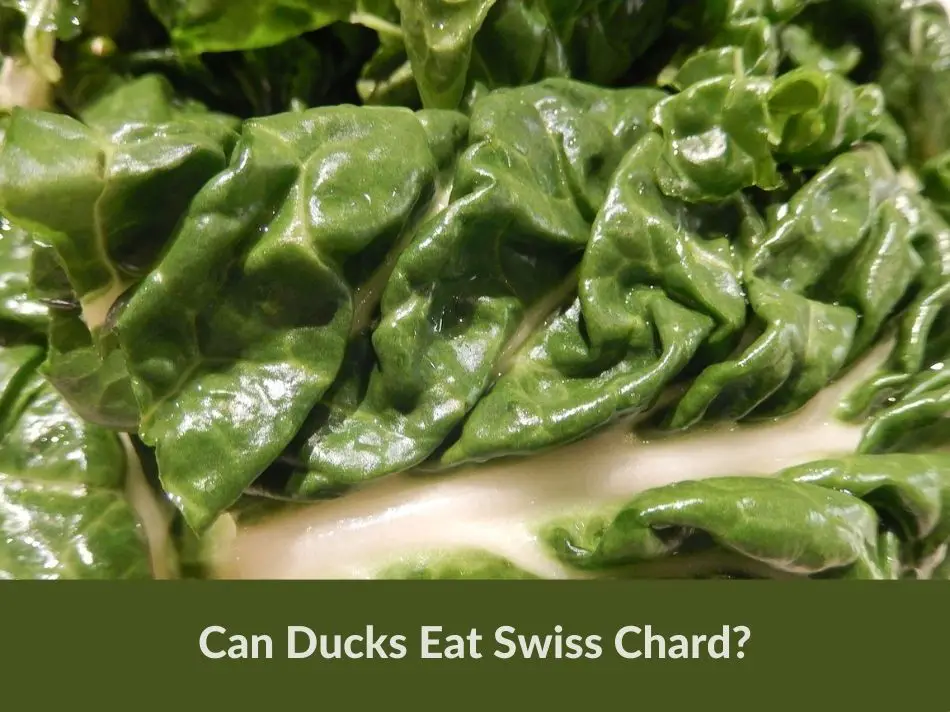Ducks are omnivores, enjoying a variety of grains, seeds, insects, and aquatic plants. A balanced diet is crucial for their well-being. While many people enjoy feeding ducks at local ponds, it’s essential to provide foods that contribute to their health, rather than common but unhealthy options like bread. But, can ducks eat Swiss chard?
Yes, ducks can eat Swiss chard. This leafy green vegetable is packed with nutrients like vitamin K, vitamin A, and magnesium. It’s a good supplement to their regular diet and offers variety, which can enrich their daily food intake.
In this article, you’ll discover the ins and outs of feeding Swiss chard to ducks. From the nutritional benefits of this leafy green to recommended feeding practices, this article covers it all.
How Often Can I Feed My Ducks Swiss Chard?
Swiss chard should not replace a duck’s standard diet but can be given as a treat. It’s recommended to feed ducks Swiss chard no more than once or twice a week. Make sure to provide plenty of clean water whenever feeding them any sort of greenery, as it aids in digestion.
Can Ducklings Eat Swiss Chard?
While adult ducks can enjoy Swiss chard, it’s not advisable for ducklings. Ducklings need a high-protein diet for the initial weeks of life, usually in the form of starter crumbles specially formulated for them. Introducing leafy greens too early may interfere with their nutritional needs.
Swiss Chard Nutritional Value
Below is the nutritional value of 100 grams of Swiss chard.
- Calories: 19
- Protein: 1.8 g
- Carbohydrates: 3.7 g
- Fats: 0.2 g
- Fiber: 1.6 g
It also contains several vitamins and minerals as listed below.
- Vitamin K
- Vitamin A
- Magnesium
- Vitamin C
- Copper
- Manganese
- Iron
- Vitamin E
- Potassium
- Calcium
Is Swiss Chard Healthy for Ducks?
Swiss chard is a nutrient-rich food that offers a variety of vitamins and minerals beneficial for ducks. For instance, vitamin K aids in blood clotting, while vitamin A is essential for good vision and a robust immune system.
Minerals like magnesium and potassium contribute to healthy muscle and nerve function. So, in moderation, Swiss chard can be a healthy addition to a duck’s diet.
- Vitamin K: Essential for blood clotting and bone health in ducks.
- Vitamin A: Important for vision, growth, and boosting the immune system in ducks.
- Magnesium: Aids in nerve and muscle function, as well as energy production.
- Vitamin C: Helps with immune response and wound healing, although ducks can produce it themselves.
- Copper: Necessary for hemoglobin formation and enhances feather pigmentation.
- Manganese: Supports bone health and enzymatic functions in ducks.
- Iron: Crucial for oxygen transport through hemoglobin; prevents anemia.
- Vitamin E: Acts as an antioxidant and supports immune function and skin health.
- Potassium: Important for fluid balance and muscle function.
- Calcium: Vital for strong eggshells and bone health, especially in laying females.
How To Feed Swiss Chard To Ducks
Follow these steps to safely and effectively feed Swiss chard to ducks:
- Select Quality Swiss Chard: Choose organic or pesticide-free Swiss chard to ensure the ducks are getting a healthy treat.
- Wash Thoroughly: Rinse the Swiss chard leaves under running water to remove any dirt or potential contaminants.
- Chop the Leaves: Cut the Swiss chard into smaller, bite-sized pieces to make it easier for the ducks to eat and digest.
- Choose Feeding Method:
- Scatter on Water: Toss the chopped pieces gently onto the water surface, allowing ducks to forage.
- Hand Feeding: Alternatively, you can offer the pieces directly to the ducks by hand.
- Provide Fresh Water: Always ensure that fresh, clean water is available, especially if you’re a visitor feeding ducks in a park, to help the ducks digest the Swiss chard.
- Monitor Consumption: Watch to ensure the ducks are eating the Swiss chard and that it is not causing any digestive upset.
More Vegetables Ducks Can Eat
In addition to Swiss chard, ducks can safely consume a variety of other vegetables. These greens and veggies can add valuable nutrients to a duck’s diet and provide a delightful change of pace from their regular feed.
Conclusion
Swiss chard can be a healthy and enjoyable treat for adult ducks when fed in moderation. If you’re a caretaker or a park visitor looking to feed ducks, remember that variety is crucial for a balanced diet. Always provide clean water along with any food, and adhere to local guidelines or recommendations regarding feeding waterfowl.
Disclaimer: The information in this article is for informational purposes only. I'm not an expert or a veterinarian.


